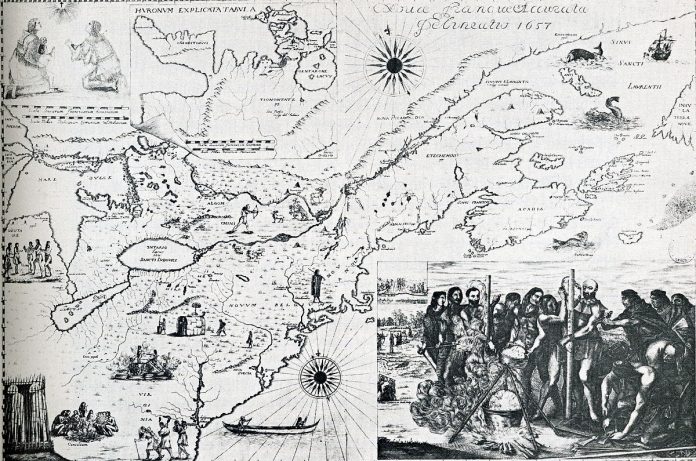Today, September 26th, is the feast of the Canadian or, if you will, the North American Martyrs. They were all Jesuits, six priests and two lay brothers, put to death for their faith. Five, Saints Jean de Brebeuf, Gabriel Lalemant, Antoine Daniel, Charles Garnier and Noel Chabanel, were martyred in Huronia, near Midland, on the southern shore of Georgian Bay, while three, Saints Isaac Jogues, René Goupil, Jean de la Lande, were put to death in what is now Auriesville, New York, not far from the Canadian border. The whole land back then was under the jurisdiction of the Quebec archdiocese (the largest one in the world; hence, ‘Canadian’ martyrs).
Each of their stories, their backgrounds, how they ended up on the missions, is all different. But there were united in their religion, their dedication to the rule and ideals of Saint Ignatius, their faith, and their desire to spread the joy and hope of that faith to their Native brethren, who, for all their noble qualities, contrary to modern myths, were by and large mired in hopelessness and often misery. One of the sad revisionisms of late is painting pre-‘colonial’ , which means pre-Christian, life in Canada as an Edenic paradise, in the rosy hues of Rousseau’s bon sauvage. As the vivid, detailed and all-too-human accounts of the Jesuit Relations make clear, life in the wilderness was anything but easy, with death by starvation or war always lurking just around the corner. ‘Savage’ may now be an inappropriate term for the first nations, as the saying goes, but it is accurate enough in their eked-out existence.
The Jesuits and their fellow missionaries were sadly accompanied and followed by unscrupulous men who gave Catholicism, and European culture in general, a bad name, a trend that, need we belabour the point, continues today. Yet the good more than outweighed whatever imperfection there was, something our modern, jejune virtue-signalers should learn.
But these Jesuits were men of noble ideals, for which they worked indefatigably for their entire lives, in the midst of the same hardships as their beloved Natives. It was for their good, primarily their eternal salvation, that they lived, suffered and eventually died, under horrific conditions. They were more than willing, desirous even, and none more than the gentle giant Jean de Brébeuf, to shed their blood for Christ, and for conversion of all peoples to Him and His salvific truth.
We may not have to give up our lives, but we must do what we can to stand against the tide of the culture of death, be counted, and proclaim the truth, boldly and without compromise or complaisance. Jean de Brebeuf recalled of the Natives that if you picked up a paddle in their canoes, you plied it all day; also, you carried your own fair share on the portages, silently, without complaint; and all of this on a handful of cornmeal at breakfast. They would take the measure of a man by how much he could stand, and they were impressed by the steadfastness of the ‘Blackrobes’. Instead of the milquetoast metrosexual ‘manhood’ we see all around us, and within our homo urbanus selves, we could stand a small share in such fortitude of our spiritual ancestors, to whom this country owes so much, yet knows so little.
On a final note, our bishops are consecrating Canada to Our Lady Immaculate today, so let us join with them in prayer.
Holy Canadian Martyrs, orate pro nobis!


